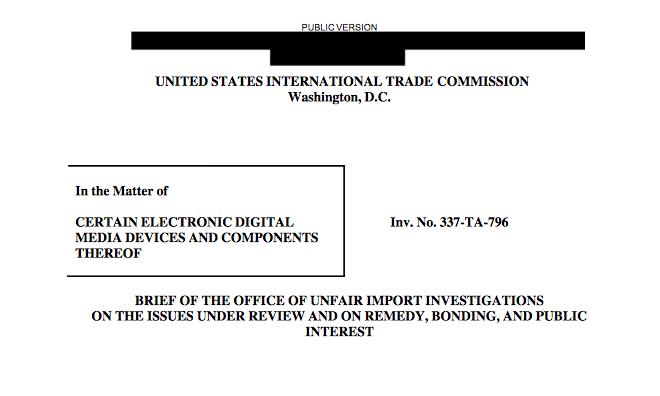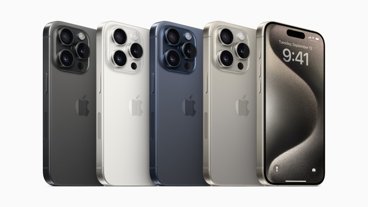ITC calls for import ban against Samsung, rejects Google's flip-flop arguments
The US International Trade Commission's Office of Unfair Import Investigations (OUII) has recommended an import ban against Samsung's Android devices infringing upon four Apple patents, rejecting contradictory, flawed arguments by Google.
A report by Florian Mueller of FOSS Patents details the recommendation, which will be next considered by the ITC's six member Commission before a ban is put into place.
Particularly notable in the ITC's staff recommendation brief is the fact that arguments by Google in support of Samsung were summarily rejected as legally incorrect, disingenuous and contradictory.
ITC destroys Google's "public interest" arguments
Google's arguments against an ITC import ban on infringing Samsung devices maintained that such action would not advance the public interest; that Apple's patents were not really 'inventive' and easy to work around; that market competition would be harmed; and that such a ban would be an "extraordinary remedy" for patent infringement.
The ITC found Google's arguments to be legally incorrect, biased and contradictory. While Google portrayed itself to the ITC as a neutral party offering a "friend of the court" perspective, the group referred to Google in the brief as a "non party," fully recognizing why Google has involved itself in the case surrounding its own Android licensee.
The staff also targeted the legal fallacy of Google's "public interest" argument, writing, "With respect to non-party Google's arguments, OUII first notes that the question is not whether an exclusion order would 'advance' the public interest (see Google Comments at 1); rather, the statute states that the Commission 'shall' issue an exclusion order 'unless' the public interest dictates otherwise. 19 U.S.C. § 1337(d)(1)."
As Mueller explains, the ITC is charged with protecting intellectual property and the rule of law, and while its power to ban infringing imports can be challenged by a significant "public interest" argument against doing so, that's a "reasonable hurdle to overcome."
Google's argument, the ITC states, has the law backward. By arguing that a ban must "advance the public interest," (and claiming that it wouldn't in this case), Google hoped to shift the burden of proof around.
"The ITC staff apparently doesn't like this distortion of the statute," Mueller noted.
Google's workaround and competitive arguments also found invalid
The second element of Google's arguments was even more strongly dismantled by the ITC staff, which wrote:
"Moreover, Google's contention that the patents are not 'inventive' and are easily designed around, even if true, actually shows the lack of impact on the public interest – once Samsung designs around the patents, then its products will no longer be subject to exclusion."
Mueller cited a recent ruling by Chief Judge Rader, who wrote, "If indeed [the defendant in that case] had a non-infringing alternative which it could easily deliver to the market, then the balance of hardships would suggest that [it] should halt infringement and pursue a lawful course of market conduct."
With regards to limitations on competition, the ITC stated:
"Finally, Google's arguments concerning the lack of competition in the marketplace (see Google Comments at 3-4) are contradicted by both the publicly-available information cited above and the Commission's findings in other recent investigations involving similar products."
The brief concludes, "Thus, OUII does not believe that the public interest precludes issuance of its proposed remedies in this investigation."
Google displays egregious hypocrisy in arguing both sides of patent cases
Google's arguments against the enforcement of Apple's patents are not just flawed, but grossly hypocritical. When arguing on behalf of its subsidiary Motorola, Google's attorneys argue the exact opposite position.
As early noted, again by Mueller, Google not only argues both sides of the law with regard to Android, but even filed contradictory policy statements on intellectual property and the role of the proper role of the ITC on the same day.
"This may have been the first time in the history of United States International Trade Commission that the same party, on the same day, submitted an anti-IP/weak-ITC policy statement and a pro-IP/strong-ITC one," Mueller observed."This may have been the first time in the history of United States International Trade Commission that the same party, on the same day, submitted an anti-IP/weak-ITC policy statement and a pro-IP/strong-ITC one."
He juxtaposed Google's pro-IP arguments against Apple and and its anti-patent arguments in favor of Android, which included a pleading in favor of a Samsung ban on Apple products related to a FRAND licensing dispute:
"… a rule that would allow it to continue to import infringing products with impunity would undermine [...] the statutory mandate of the ITC," Google's attorneys wrote.
"It would, in short, allow infringers to cause the exact harm on domestic industry and United States consumers that Congress intended the Commission to prevent."
So much for the "public interest" in ignoring intellectual property, at least when it concerns Apple's. An in this case, Google was arguing for import bans on FRAND patents while arguing against the enforcement of Apple's, which are not under FRAND terms.
Globally, courts have generally rejected sales bans on FRAND patents, apart from the ITC's recent, controversial decision to ban certain older iOS devices based on Samsung's FRAND patent claims asserted on Infineon chips, which have already paid to license Samsung's FRAND patents in a case where Samsung argues for more money from Apple regardless).
Google digs deeper into the hypocrite bucket
Directly contradicting its own "public interest" argument against Apple's patents, Google's attorneys wrote, in support of Samsung's efforts to ban Apple products over FRAND claims:
"The 'public interest' exception to the statute has historically been narrowly and rarely applied, reflecting the proper balance between the public’s interest in competition from imported goods and the enforcement of patent rights, which has furthered technological advancement in the nation."While Google claims Apple's efforts to obtain an import ban over Samsung's infringements are "extraordinary," it uses the opposite word to describe Samsung's efforts to ban Apple's products.
And while Google claims Apple's efforts to obtain an import ban over Samsung's infringements are "extraordinary," it uses the opposite word to describe Samsung's efforts to ban Apple's products:
"Where [...] the Commission has found a violation of Section 337, the ordinary presumption in favor of issuance of an exclusion order should apply," Google wrote in favor of Samsung.
"Congress intended injunctive relief to be the normal remedy for a Section 337 violation and that a showing of irreparable harm is not required to receive such injunctive relief," it later added. [emphasis added]
Waiting for finality
The ITC staff's dismantling of Google's input in the Samsung case doesn't necessarily mean that the Commission will enact an import ban of infringing Samsung devices, and Mueller details a series of issues that would affect the potential scope of the ITC's final decision.
"I'm sure there will be at least some infringement finding(s)," Mueller wrote, adding that "the question is just how many of the four patents the judge found infringed will ultimately be deemed valid and infringed."
If a ban is enacted, Samsung will be required to post a substantial bond equal to 58 percent (recommended by the ITC staff) or up to 88 percent (recommended earlier by Judge Pender) of its relevant US smartphone sales during the presidential review period.
 Daniel Eran Dilger
Daniel Eran Dilger











 William Gallagher
William Gallagher
 Christine McKee
Christine McKee
 Michael Stroup
Michael Stroup
 William Gallagher and Mike Wuerthele
William Gallagher and Mike Wuerthele


 Chip Loder
Chip Loder
 Andrew Orr
Andrew Orr






